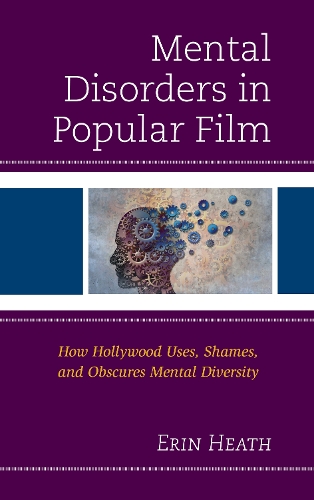
Mental Disorders in Popular Film: How Hollywood Uses, Shames, and Obscures Mental Diversity
(Hardback)
Available Formats
Publishing Details
Mental Disorders in Popular Film: How Hollywood Uses, Shames, and Obscures Mental Diversity
By (Author) Erin Heath
Bloomsbury Publishing PLC
Lexington Books
28th February 2019
United States
Classifications
Professional and Scholarly
Non Fiction
Psychology
Abnormal psychology
Clinical psychology
Media studies
Violence and abuse in society
791.436561
Physical Properties
Hardback
106
Width 161mm, Height 232mm, Spine 13mm
354g
Description
Contemporary Hollywood films commonly use mental disorders as a magnifier by which social, political, or economic problems become enlarged in order to critique societal conditions. Cinema has a long history of amplifying human emotion or experience for dramatic effect. The heightened representations of people with mental disorder often elide one category of literal truths for the benefit of different moral or emotional reasons. With films like Fight Club, The Silence of the Lambs, The Dark Knight, and Black Swan, this book address characters identified by film or media as people who are crazy, mentally ill, developmentally delayed, insane, have autism spectrum disorder, associative personality disorder, or who have other mental disorders. Despite the vast array of differences in peoples experiences, film often marginalizes people with mental disorders in ways that make it important to be inclusive of these varied experiences. These characters also commonly become subject to the structures of hierarchy and control that actual people with mental disorders encounter. Cinematic patterns of control and oppression heavily influence the narratives of those considered crazy by the outside world.
Reviews
Heath brings an engaging style to dense theoretical material and complicated films. Working with classics of disability in cinema, such as Rainman, as well as more recent popular films, such as Black Swan and Batman Begins, Heath delves into the ways that disability is portrayed and how it is used cinematically to tell particular stories. This highly teachable book offers more contemporary texts and a focus on mental disorders, making it a necessary update to the canon of disability within film and media studies. -- Elizabeth Ellcessor, University of Viriginia
Erin Heath draws fascinating and sometimes startling lines of connection between thematic elements of every film she analyzes. Her mastery of the language of film criticism is impressive, matched only by the accessibility of her writing style. So many factors engage my interest in these chaptersamong them Heaths facility with ranges of theorists such as Foucault and Butler, Marx and Siebers. I find myself learning more about both films and theory I thought I had mastered! Heaths messagethat Hollywood films steer their depictions of characters with mental disorders into the lanes of marginalization and dangeris ultimately emancipatory for real persons with these diagnoses. I need this book for my students in Disability and Media classes! -- Mark O'Hara, Miami University
Mental Disorders in Popular Film is a delightful manuscript with many intriguing critiques of popular media depictions of disabilitya rare find indeed. The author includes disability theory, scholarly literature, political critique, intersectionality, misconceptions (and corrections), and eye-opening revelations of how mass media manipulates its viewers outlooks on mental illness and developmental disabilities. These five chapters or cases each contain two movie examples to enlighten readers in ways which cannot be unseen or unknown, all wrapped up in a highly accessible read suitable for both studentsand everyone else. Moviemakers beware! -- Kimberly Maich, Associate Professor of Education, Memorial University
Author Bio
Erin Heath is associate professor in the School of Languages and Literature at Wayland Baptist University.
